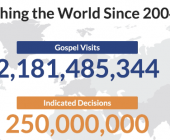What People Find Entertaining Points to Objective Morality
God has revealed Himself in the natural world (Psalm 19:1-6) as well as through the Bible. (vv. 7-14) This revelation is progressive, meaning that layers of meaning increased as God inspired more Scripture throughout history.

God’s disclosure of the explicit nature and duration of the final judgment is one example of this. It isn’t fully made until the closing of the canon of Scripture. His first warning to mankind in Genesis 2:17 was accurate. Literally, He said, “dying, you shall die.” By quarantining them from the tree of life (Gen. 3:22-24) and God’s Holy presence; by cursing their bodies with age, decay, susceptibility to illness and pain; by allowing alienation to affect their relationship with one another and decay and futility to seep into the rest of creation, God ensured they’d need to continue seeking Him for satisfaction, significance and security. (Romans 8:18-24)
How were they expected to seek Him if He had banished them and hidden Himself from them?
Despite their banishment, they were not left without revelation. The fact that Eve named her first son by adding “I have gotten a man” (Gen. 4:1) may hint that she was counting on the immediate appearance of the Offspring predicted in Genesis 3:15 and whatever deliverance she expected Him to provide. Psalm 19:1-6 asserts that even the cursed creation reveals the glory of God, and His fear (v.9) is clean. Acts 17 shows that His purpose in placing each person in their proper time and place is “that they should seek God, and perhaps feel their way toward him and find him. Yet he is actually not far from each one of us.” (Acts 17:27)
The Bible thus provides the best depiction of human nature. We are not basically good, as many philosophies assume. We are also not as depraved as we could be nor are we hopelessly corrupt. When we behave in a moral way or judge one another for immorality without prior knowledge of God’s moral law, we show that it is neither a matter of common sense consent, nor an arbitrary personal decision, but a moral truth sensed on another level. This higher law to which we appeal makes us inadvertently condemn ourselves when we violate it, rationalizing our faults. This is part of how the Bible claims we aren’t utterly ignorant of the truth, we aren’t incapable of discovering the truth, but we suppress the truth. (Romans 1:18-2:16)
Our irresistible urge to suppress the truth permeates our culture. Perhaps there’s no better example of this than our entertainment.
The television comedy, “The Good Place,” shows some evidence of this effect. Its premise is that four people have recently died and, arriving in the afterlife, they are told they are in “The Good Place.” How a person makes it there is quickly explained: a careful mathematical assessment of every person’s prior motivation, their actions and the outcome of those actions is made throughout their lives, and only those persons with a point total showing a high net positive outcome for their existence make it to the Good Place. Meanwhile, for those who don’t make it, the “Bad Place” is a place of endless torture perpetrated on helpless humans by immortal demons.
In her own heart, Eleanor, the main protagonist, knows immediately an error has been made, and the rest of the first season is her attempt to pretend she’s the person she’s alleged to be, as she makes mistake after mistake, narrowly escaping exposure each time. We’re led to assume similar mistakes have been made in favor of the other four main characters, until, by the end of the first season, it’s revealed that the host and “Architect” of the “Good Place,” Michael, is actually a demon and they’re all really in The Bad Place. In another season, we learn that, because of corporate greed, corrupt governments and the interdependence of our decisions, no human being has made it to the actual Good Place in over five hundred years.
In subsequent seasons, we learn that despite endless resets, in which the friends’ memories are wiped, and they attempt to grow in goodness, it’s not possible to progress in the afterlife because one’s motivation becomes to achieve the Good Place once they’re aware of the stakes. On top of this, during a visit to what they’re told is the actual Good Place, the friends learn that, without the possibility of death to give life meaning, even everything you could ever want is mind-numbingly boring. It’s clear to Christian watchers that without God, there can’t be a paradisiacal Good Place or a just Bad Place. The show’s creators, including some ethics professors, have depicted sin relatively accurately in at least four basic ways:
- Those things we believe are private peccadillos are inevitably harmful to ourselves and to others.
- Sin is with us from the beginning, and our good deeds will never erase our bad ones.
- Each sin begins in the heart, and has to do with self-centered motivations, but also an inability to accurately project outcomes.
- We fall short, and cannot redeem ourselves.
That’s not to say that the intuitive understanding of some correct things about judgment means that the show is some kind of Christian metaphor, for it spends plenty of time ridiculing the concepts of omniscience, omnipotence and wise moral judgment. It also begins by answering (albeit through the words of the deceiving demon host) Eleanor’s question about religion, “So who was right?” Michael answered, “Well, let's see… Hindus are a little bit right, Muslims a little bit, Jews, Christians, Buddhists… every religion guessed about 5%…” Even with moral reasoning which at times is very reflective of truth, the writers will not “see fit to acknowledge God,” as Romans 1:28 puts it. Ultimately the viewer is constantly invited to admire and enjoy the four plucky rebels, even though at heart, they’re usually far from admirable in character. And this makes it possible for the show to succeed. Modern audiences have little appetite for characters whose moral choices indict their own. It seems we find characters most entertaining when they are either blissfully unaware of, or brazen and outrageous in, flaws which would shame most of us. Judgmentalism, for the architects of culture, is the new unpardonable sin.













